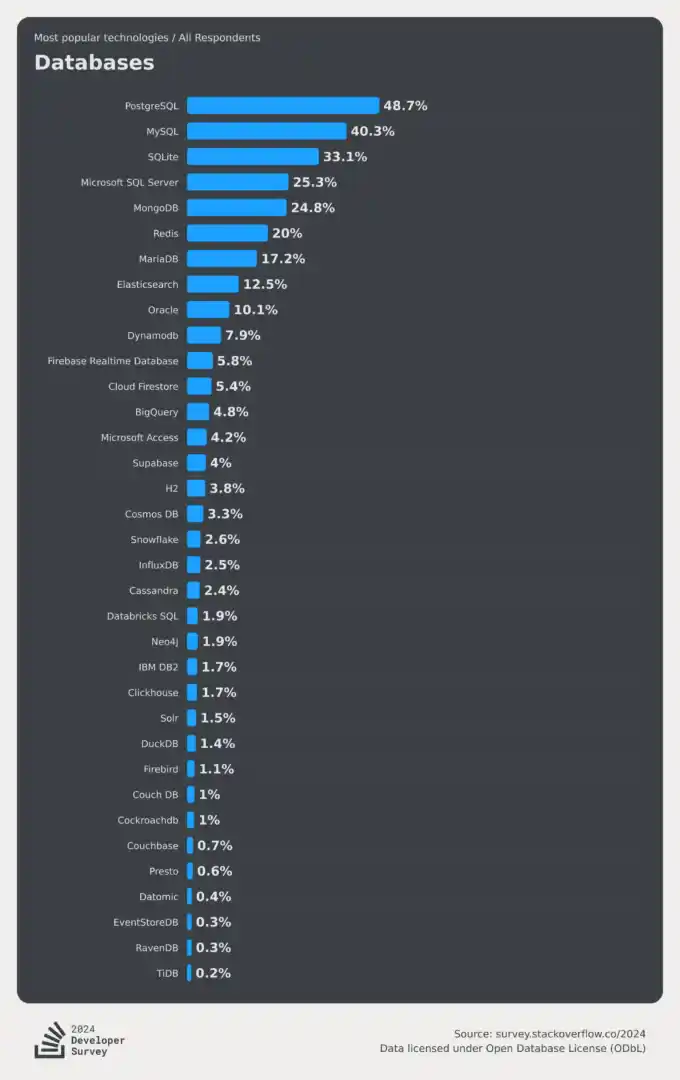Table of Contents
PostgreSQL over MySQL for Complex Apps
When choosing a database for a complex application, developers often weigh the benefits of relational databases like PostgreSQL over MySQL. While both databases are widely used and have their capabilities, PostgreSQL offers several advantages that make it ideal for complex applications.
This article explores the key features and advantages of PostgreSQL over MySQL that set PostgreSQL apart, focusing on aspects such as data integrity, advanced data types, extensibility, and better performance optimization.
Superior Data Integrity and ACID Compliance
PostgreSQL strictly adheres to ACID (Atomicity, Consistency, Isolation, Durability) principles, which ensure reliable behavior and improved data integrity, which is essential for robust applications Isolated storage for MySQL with different ACID support. Unlike engines, PostgreSQL provides an integrated approach.
In contrast, many NoSQL databases prioritize scalability over strict ACID compliance, often sacrificing stability for simplicity and high availability, which may not be suitable for applications that demand strong data integrity.
Key benefits of robust implementation:
- Trusted Attributes: Ensures data integrity across financial applications, e-commerce platforms, and other systems where strict data consistency is required.
- Advanced locking mechanism: PostgreSQL supports various transaction isolation levels and provides a more advanced locking mechanism than MySQL, reducing the risk of deadlock and improving concurrency.
Advanced data types and indexing
PostgreSQL supports advanced data types that are not natively available in MySQL. These include JSON, XML, arrays, hstore (key-value pairs), and more. This flexibility allows developers to model complex data naturally and efficiently.
Key benefits of robust implementation:
- JSON and JSONB support: PostgreSQL’s support for JSON and JSONB data types enables you to store and query JSON data efficiently, which is important for applications that require data modeling, such as content management systems or APIs.
- Advanced indexing options: PostgreSQL offers many indexing options, such as B-tree, Hash, GiST, GIN, SP-GiST, and BRIN, which allow developers to customize query performance based on specific applications MySQL especially uses B tree indexes, which of complex queries If done, should not be so versatile.
| Aspect | JSON | JSONB |
| Parsing time | Less | More |
| Data storage format | Raw text | Custom binary |
| Write | Faster to write, only minimal JSON validation | Slower to write due to binary conversion overhead |
| Read | Slower to read, reparsing needed | Faster to read |
| Reparsing required | No | Yes |
| White spaces | Preserved | Removed |
| Duplicated keys | Preserved | Only the last value is kept |
| Order of keys | Preserved | Can be altered |
| Index support | No | Yes |
Expansion and customization
One unique feature of PostgreSQL is its extensions. It allows developers to add custom functions, data types, and operators. This design process is valuable for complex applications that may require specialized functionality that is not provided out of the box.
Key benefits of robust implementation:
- Default functionality and stored procedures: PostgreSQL supports multiple programming languages (PL/pgSQL, PL/Python, PL/Perl, etc.), and allows developers to write programs in deliberate and hidden order in the language of the dominant relief.
- Custom Data Types: Determining custom data types helps build domain-specific applications where standard data types are insufficient.
Better performance for complex queries
PostgreSQL is designed to handle complex queries and large data sets efficiently. Its query planner is more advanced than MySQL, allowing for more sophisticated optimization. PostgreSQL also supports parallel query execution, which can significantly speed up query performance in multicore environments.
Key benefits of robust implementation:
- Efficient Query Scheduling: PostgreSQL query scheduling uses advanced algorithms to determine the most efficient way to execute a query, especially in complex applications where query scheduling is important.
- Parallelism: Support for parallel query execution makes PostgreSQL more efficient on multi-core processors, making it ideal for data-heavy applications that require high performance.
Better concurrency control
PostgreSQL uses Multi-Version Concurrency Control (MVCC), which allows multiple connections to run simultaneously without closing the database, increasing performance and scalability MySQL also supports MVCC but with limitations depending on the storage engine used on the snow.
Key benefits of robust implementation:
- Higher Throughput: MVCC provides better concurrency by allowing read and write operations to run simultaneously, reducing wait times in high-traffic areas, and improving throughput.
- Reduced deadlocks: The use of PostgreSQL MVCC reduces the possibility of deadlocks, making it more suitable for complex applications with multiple concurrent users.
Most Used Database
As per the recent StackOverflow 2024 survey result. PostgreSQL is the most used database.

Conclusion
While MySQL remains a popular choice for many developers due to its simplicity and speed in heavy-read environments, in this article we went over the advantages of PostgreSQL over MySQL, especially in complex applications.
PostgreSQL excels in areas like data integrity, enhanced data type support, extensibility, and superior performance. Its exceptional concurrency capabilities make PostgreSQL a powerful and versatile choice for applications demanding high reliability and flexibility. Developers building scalable, high-performance applications should strongly consider PostgreSQL for their database needs.